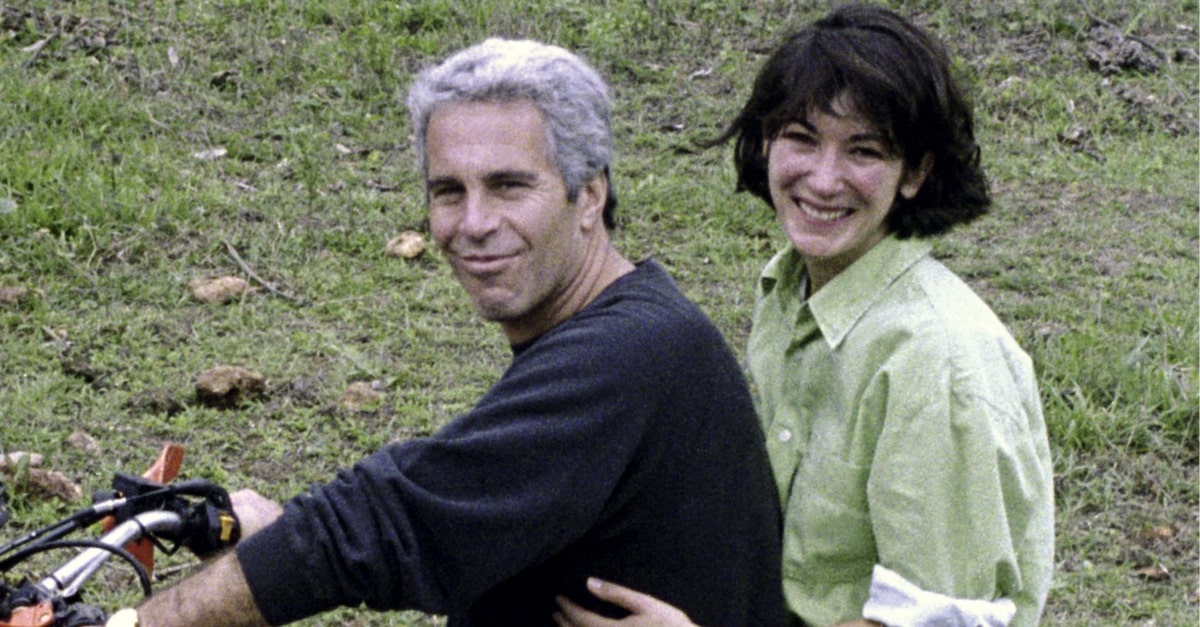
A photograph of Jeffrey Epstein and Ghislaine Maxwell found during a 2019 raid on Epstein's New York townhouse (DOJ).
A federal appellate court on Tuesday upheld Ghislaine Maxwell's convictions for conspiring to commit sex trafficking with Jeffrey Epstein by enticing young girls and grooming the victims for abuse, leaving the fallen British socialite's 20-year sentence undisturbed.
The U.S. Court of Appeals rejected the argument from Maxwell's team that the 2007 Epstein sweetheart plea deal in the Southern District of Florida still protected her in the Southern District of New York. That deal infamously included a non-prosecution agreement for "potential co-conspirators" as Epstein agreed to admit to charges of soliciting prostitution of a minor and served local jail time instead of, at that time, facing a major federal case.
Maxwell made that argument without success more than a year before U.S. District Judge Alison Nathan sentenced her in June 2022, but she repeated it again in her March 2023 appeal, claiming that the government caved to "public outrage over an unpopular non-prosecution agreement" and was punishing her instead of the "person responsible for the crimes," Epstein, who died by suicide in jail as he awaited trial in 2019.
"In its zeal to pin the blame for its own incompetence and for Epstein's crimes on Maxwell, the Government breached its promise not to prosecute Maxwell, charged her with time-barred offenses, resurrected and recast decades-old allegations for conduct previously ascribed to Epstein and other named assistants, and joined forces with complainants' civil attorneys, whose interests were financial, to develop new allegations that would support charges against Maxwell," Maxwell's appellate brief said.
On Tuesday, the Second Circuit was clear that it found "no errors in the District Court's conduct of this complex case" — whether by denying Maxwell a new trial after a juror's "erroneous" answer to a question on if he was a sexual abuse victim, by rejecting her statute of limitations arguments, or by deciding without an evidentiary hearing that the more than a decade old non-prosecution agreement wasn't binding.
"We hold that Epstein's NPA did not bar Maxwell's prosecution by USAO-SDNY as the NPA does not bind USAO-SDNY. We hold that Maxwell's Indictment complied with the statute of limitations as 18 U.S.C. § 3283 extended the time to bring charges of sexual abuse for offenses committed before the date of the statute's enactment," the court said. "We further hold that the District Court did not abuse its discretion in denying Maxwell's Rule 33 motion for a new trial based on one juror's erroneous answers during voir dire. We also hold that the District Court's response to a jury note did not result in a constructive amendment of, or prejudicial variance from, the allegations in the Indictment. Lastly, we hold that Maxwell's sentence is procedurally reasonable."
While elaborating on the reasoning for walling-off the non-prosecution agreement claim, the appellate court said it is "well established" in the Second Circuit that a plea agreement "binds only the office of the United States Attorney for the district in which the plea is entered unless it affirmatively appears that the agreement contemplates a broader restriction,'" and there was "nothing" in the Epstein deal that "affirmatively shows that the NPA was intended to bind multiple districts[.]"
"Instead, where the NPA is not silent," the court continued, "the agreement's scope is expressly limited to the Southern District of Florida."
The court affirmed that the trial judge "correctly denied Maxwell's motion without an evidentiary hearing."
Four women who were teens at the time of their abuse testified at Maxwell's trial — three of them under the pseudonyms "Jane," "Kate," and Carolyn, with Annie Farmer testifying under her full name. Carolyn, for instance, testified that Maxwell touched her breasts and that Maxwell saw her naked around 30 times in Epstein's massage room, beginning at the age of 14 years old. Jane similarly told jurors that she met Maxwell and Epstein at the Interlochen arts academy in Michigan when she was 14. Maxwell was walking by with her "cute little Yorkie" and Epstein, they struck up a conversation, and Jane gave them her mother's contact information, leading to a follow-up meeting in Epstein's Palm Beach house and years of abuse, she testified.
In the end, after Maxwell was acquitted only of one count, one of her defense lawyers insisted she was innocent and looked forward to being "vindicated" upon appeal.
That vindication has not come to pass. Bureau of Prisons records say that Maxwell is incarcerated at FBI Tallahassee and has a release date of July 17, 2037.
Law&Crime sought comment from Maxwell appellate attorney Arthur Aidala.
Read the Second Circuit ruling here.
Comments